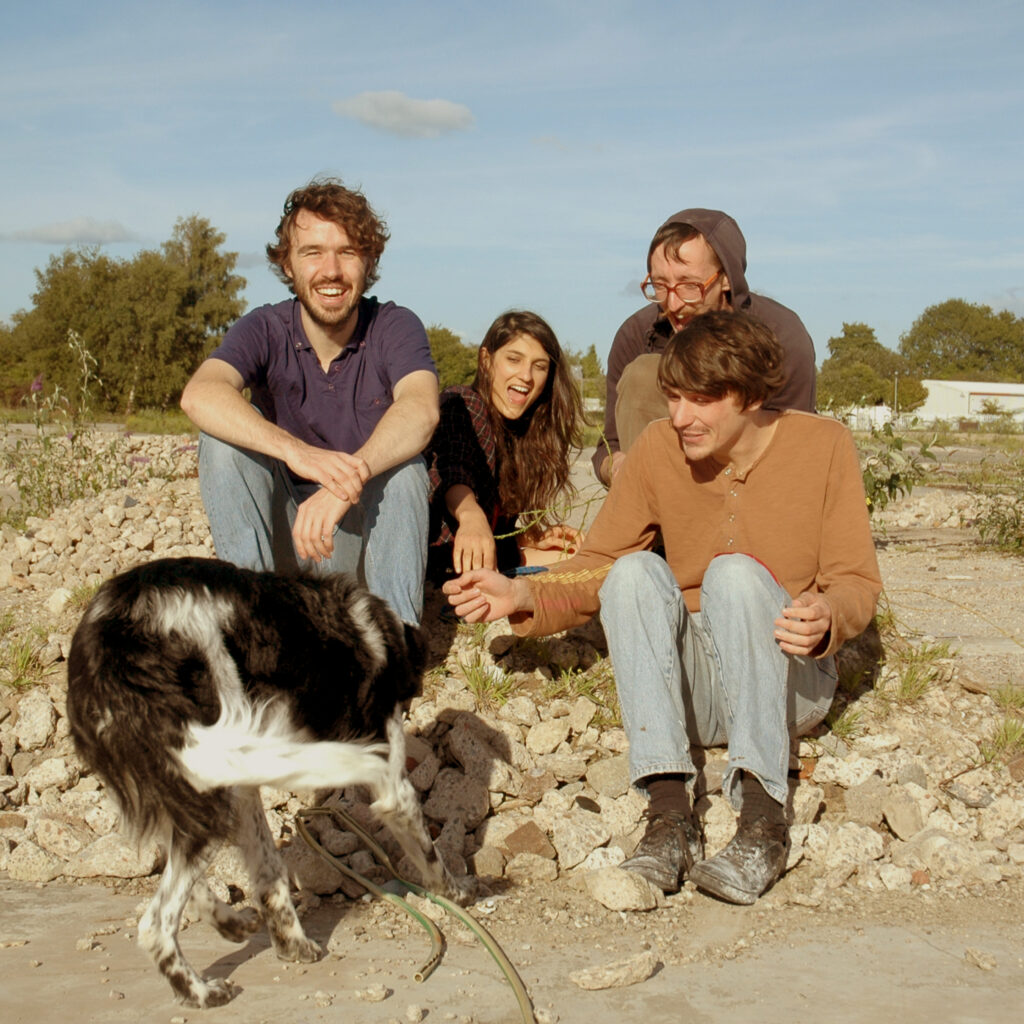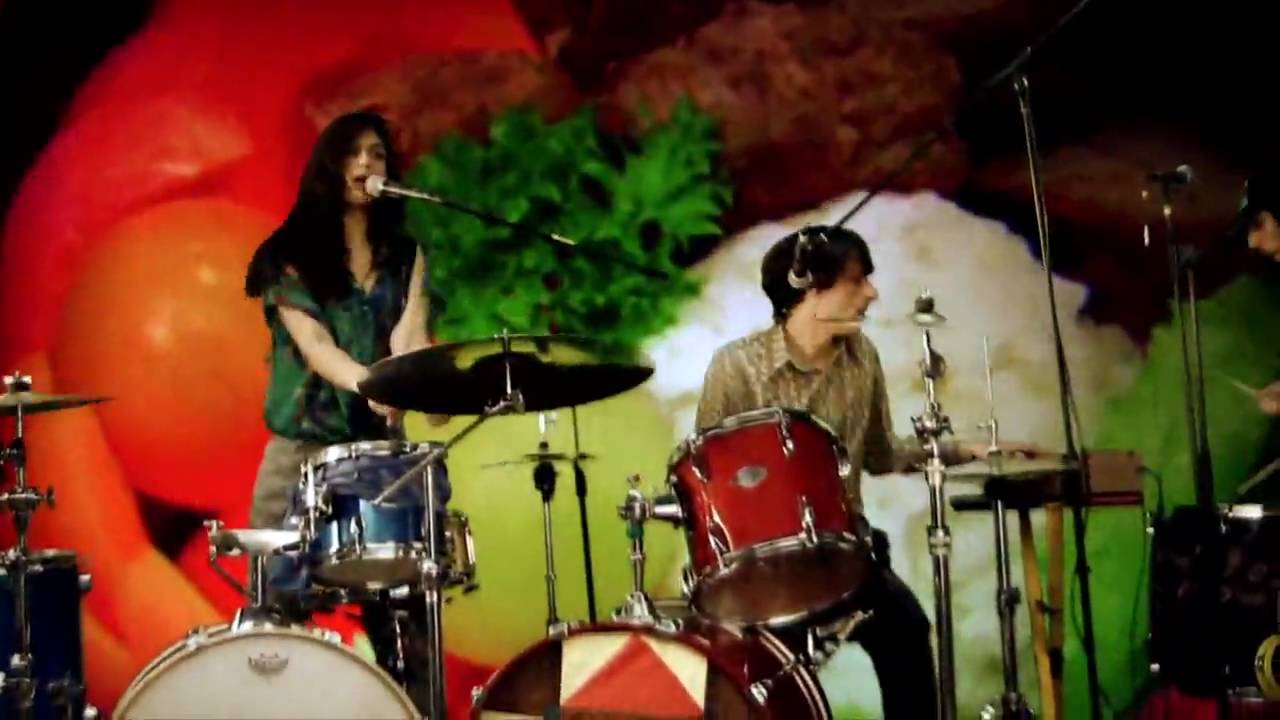Like any human being with the semblance of a heartbeat, I’m not in the habit of turning down a slice of homemade cake. So, when Islet’s Emma Daman presents me with a piece of her "third cake of 2011" – a glorious walnut, date and banana affair – I settle back into the Jackanory armchair of her and singer Mark Thomas’s cosy back room, and savour each mouthful.
On the day of our interview, there is a Varsity event in Islet’s hometown of Cardiff and the town centre is awash with students seemingly intent on heroic inebriation. I’m relieved to escape to a suburb north of the city to seek out the grandly titled Rhombus Rooms ("our last house was called The Hexagon", they reveal) which doubles up as a HQ for a band who are committed to developing Islet on their own terms, at their own pace.
Formed from the remnants of local bands The Victorian English Gentlemens Club, attack + defend and Them Squirrels, the Cardiff collective (Emma and brothers John and Mark make up the core members) have taken a pragmatic view on the financial issues facing any new band and created an ideology that fuels creativity while keeping their expectations grounded.
Emma and Mark have both actively decided to maintain their day jobs, refusing to allow Islet to fall into the trap of previous bands in succumbing to the insidious desperation fuelled by generating money out of the music. Consequently, Islet is their band, governed by their rules. Islet are highly unlikely to Tweet or Facebook their every thought, or tour endlessly, to have themselves continuously ‘out there’. They will, however, produce an innovative brand of fractured, beat-laden post-rock (check out last year’s impressive EPs Celebrate This Place and Wimmy) and send out copies of their delightful handmade fanzine The Isness – but only if you are interested.
You have each played in a number of bands before starting Islet. What was the initial raison d’être for the band?
Mark Thomas: It started as the three of us, and we all had the same idea. Both Emma and my brother John played drums in their last bands, so, in the beginning, we wanted to make something quite rhythmical and free.
Emma Daman: Not just because we had experience of that, but because we love percussion, movement and rhythm. And we wanted to start something where we didn’t have any set roles. We just used to set up loads of gear – more gear than there were people – and just move around.
Your music is pretty chameleonic – was there a conscious decision about what you wanted Islet to sound like?
ED: There are certain things that we all love and we kind of wanted Islet to be a bit like – stuff like Gang Gang Dance and Can.
You sense of experimentation and playfulness puts me in mind of bands like Pavement, Deerhoof or your Cardiff peers, The Victorian English Gentlemens Club.
ED: Well, out of those three bands you have chosen, we listen to Pavement and Deerhoof loads and I was in the third band!
MT: I’ve been a huge Pavement fan forever. But we want to make a band that isn’t like other bands. We wanted to do something rhythmical and – dancey sounds wrong – we wanted to make music that had lots of feeling in it.
You both have day jobs. Mark, I believe you work with disabled children – does this impact on how you think about Islet?
MT: Absolutely. Partly because of the nature of my work I’ve always got this thing where I want to live life to the max. I work with children who are locked in their body and so I want to take advantage of not being restrained. Just forming a band and going up on stage in front of people allows you a release that [others] don’t normally have.
ED: It was really important to us, as well, that we could be something we were proud of and that we don’t let ourselves down. I think the only time when you get disappointed is if you don’t do something that you have an instinct in you to do.
When you started the band, you didn’t have a MySpace page or any of the other social networking paraphernalia, however you produce The Isness, a handmade fanzine. Why did you initially reject the bog-standard internet-based communication tools?
MT: It is just what we naturally wanted to do as a reaction to lots of other bands. In general, with the social networking things, bands give so much out about themselves.
ED: Also, we just really like printing and paper and we find it really exciting. People have sent us loads of nice stuff, so it is like an exchange. We are not anti-technology – we’ve got laptops and iPhones, we’ve also got a blog where we put up what we are doing. Also, The Isness is completely free but we are not promising anything in a regular way. A massively important part of this is that people only get The Isness if they ask for it. So, they have to subscribe to it and be interested in it. It is not like a promotional thing, where we are sending things out and trying to get people to like us.
I get that – each issue of The Isness is unique and personal. I’m looking at the first issue, which is lovingly made and tied in ribbon. I’d love to receive something like this – but how would this concept work if you became more popular and had thousands of people signing up to The Isness?
ED: Well, we’d like more time to do these things that we want to do, but then at the same time, if we were reliant on having to make a lot of money through this, we might have to sell some of our principles. I’d rather wait until that point happens and make a decision about it then.
I get the sense that because you have decided not to be reliant on Islet to support you financially, it means you can develop the band on your own terms, and at your own pace. Am I right?
MT: That’s pretty accurate. That is exactly what we want, basically. We are a different case from some bands, in that we’ve experienced that before in the way of ‘we all need to give up our day jobs, that’ll be the thing that makes us successful’. We have got an idea that we like and are all really happy with.
ED: There is no reason why we can’t do it on our own terms. We invented it and started it, so we don’t have to do it in another way, because we don’t have to do it at all. It doesn’t matter to anyone else, at the end of the day. The best thing for us to do is be happy in other ways as well, and not be reliant on the band as being the sole bringer of joy and happiness into our lives. You’ve got to make yourself happy in the other ways, or else it is too much pressure and people tend to get disappointed.
I can completely relate to that philosophy. But, is there a danger that your ‘pace’ won’t be fast enough for a public that is used to bands churning out records and touring endlessly?
MT: Yes, we’ve been offered tours and things that we have said ‘no’ to, because it wasn’t exactly the right timing for us to do that, whereas previously we’d have definitely said ‘yes’, because that will mean we are ‘doing the band’ as it were.
ED: And we are ticking over, even if nobody knows except us in the house and we are making music and writing. You don’t always have to go out on tour. And then it makes it more exciting when you do gigs. I know all the festivals that we are going to do this summer. I can think about them and get excited by them.
I can see that developing Islet on your own terms – as opposed to reacting to record label pressure – must be very empowering. It seems very different to bands who are desperate for commercial success. Does it feel different?
ED: Yes, but there are things that are more important than this as well. Like families and everyone being happy and safe.
MT: I know myself that I have gone through that stage where the band takes over your life, and you would miss your mum’s birthday to do a gig for the first time at the [Cardiff] Barfly. I’m past all that now. Having said that, you know what is gonna happen next year – we will be at some festival on my mum’s birthday.
I believe you are working on your debut album. How is it coming along?
ED: The first two [EPs] we did as a four-piece and we made both of those records ourselves – recorded them ourselves, mixed them ourselves – and then this one we are working on at the moment, we are writing as a three-piece and we are going to record it as a three-piece but we are going to work with a producer.
MT: We will play it live as a five-piece. I think we all agree that the way we started was as a three-piece, and that was when we were creatively most prolific.
ED: Sometimes it is easier to start writing as a three-piece, as it simplifies the sound and then you can start to add other stuff to it.
Now you have both gone coy on me. You have to give me a little clue as to how it will sound.
ED: Erm, this record will be percussive, it will have a lot of drums.
Thanks – that is very enlightening.
MT: Ha. There is only so much I can say. I’m reluctant to say ‘it is so different’ or ‘it’s gonna blow your mind’ – all I can say is that it is just more music that we are doing at the moment!




